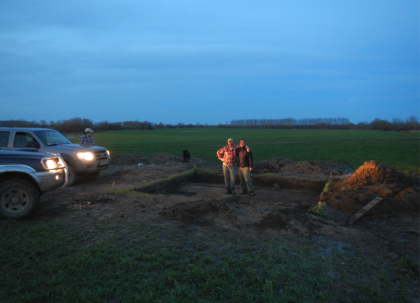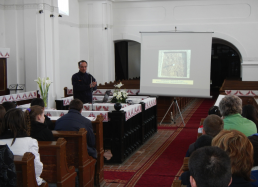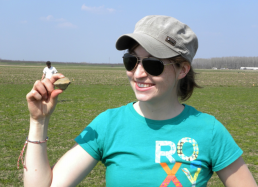4. Winding Down
These last couple weeks haven't been easy. We've made progress, but we've continued to be hammered by rain on a daily basis. In my last dispatch, I reported that two of our Greek colleagues—Drs. Takis Karkanas and Apostolos Sarris—had just arrived. Although it rained—or snowed (or hailed)—every single day that they both were here, we managed to get them into the field so they could do their jobs.
The excavations suffered horribly from the weather because it's nearly impossible to excavate in a hard rain. The rain destroys all the stratigraphy and mixes up all the different deposits that we work so hard to keep separate. It also creates a huge time problem for us.
Since it has been so wet, we cannot take the levee road we normally use because just by driving on it we'll start to destroy the levee, which right now is doing its very important job. All the rivers in eastern Hungary are the highest they've been in years—since at least the early 1980s. This is the wettest spring since the early 1900s, and the rivers are within a couple meters of overflowing the banks of the levees.
The problem with not being able to drive to the site on the levee road is that we have to carry all our equipment in by foot (about 30 minutes to the southern part of the site, almost 45 to the northern blocks), and then we need to bail all the water off the tarps in the units and open the excavation blocks to let them dry before we can begin working on them.
If it starts raining, we need to cover up the units, pack up our equipment and the finds, and head back to the car. At the least we lose about an hour and a half because of the rain. All this means that we lose valuable excavation time, which until this year we've taken for granted. Attila did the math and from an efficiency standpoint, all the excavation we've done this year is the equivalent of what we did in a week (or less) last year.
Apostolos's geophysical work has been hampered by the rough weather this year, too, as you can see in the "Underwater Geophysics" Video. We've been collaborating with Apostolos since 2000, and his geophysical work at the site has been critical in helping us reconstruct the organization of these prehistoric settlements. His efforts have helped us establish the massive size of the village at Szeghalom-Kovácshalom and have been critical in helping us figure out how to approach the site for excavation.
Takis Karkanas’ work was successful, but not easy. Despite the horrible weather, he managed to extract several samples of the soil from the tell trench and from the longhouse in the north (take a look at the "Micromorphology: Sampling Soggy Soil" Video to see the stages of how these extractions are done). The samples will be impregnated with epoxy and then cut and polished into thin sections so they can be examined under a microscope to explore how the site grew over time.
The weather finally broke the last two days of the season and we were able to get some work done. We pushed it hard and ended up finishing our excavations in front of the headlights of the cars (see above photo.)
During this last week, we (well, Attila, really) gave presentations about our work at the Vésztő library and at one of the churches in town (see Photo #1 below.) We’ve been working in Vésztő for 13 years, and many of the people in town are familiar with our project. It's always nice to have an opportunity to let everyone know how fortunate we feel to be accepted by the community.
One last piece of good news: Dani Riebe, my graduate student from UIC, learned that she was awarded a Fulbright Scholar Award to study in Hungary next year. She previously learned that she received a Women in Science Graduate Fellowship from the Field Museum, as well as a grant from the National Science Foundation to conduct her dissertation research. We all wish Dani the best of luck as she finishes up her graduate career! (See Photo #2 below.)
This is my last dispatch from the field for this year. We're packing up right now, and tomorrow we'll move all our equipment and the finds into storage. Then we'll drive up to Budapest. My flight leaves early Saturday morning, and I'm looking forward to getting home to my family!
Best,
Bill





